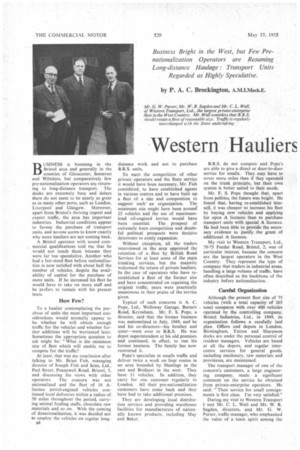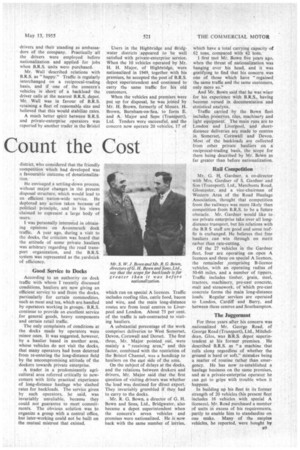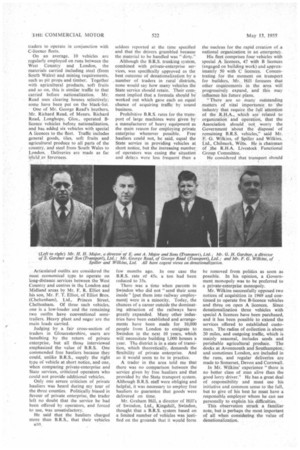Western Hauliers Count the Cost
Page 42

Page 43

Page 44

If you've noticed an error in this article please click here to report it so we can fix it.
BUSINESS is booming in the Bristol area and generally in the counties of Gloucester, Somerset and Wiltshire. but comparatively few pre-nationalization operators are returning to long-distance transport. The docks are extremely busy and delays there do not seem to be nearly as great as in many other ports, such as London, Liverpool and Glasgow. Moreover, apart from Bristol's thriving import and export traffic, the area has important industries. Industrial conditions appearto favour the purchase of transport units, and no-one seems to know exactly why more hauliers are not coming back.
A Bristol operator with sound commercial qualifications told me that he would not touch them because they were far too speculative. Another who had a fair-sized fleet before nationalization is now satisfied with about half the number of vehicles, despite the availability of capital for the purchase of more units. If he increased his fleet he would have to take on more staff and he prefers to remain with his present team.
How Few?
To a haulier contemplating the purchase of units the most important considerations would normally appear to be whether he will obtain enough . traffic for the vehicles and whether further additions will be warranted later. Sometimes the appropriate question to ask might be: "What is the minimum size of fleet which will enable me to compete for the traffic?
At least, that was my conclusion after talking to Mr. Brian Fish, managing director of Joseph Fish and Sons. Ltd., Peel Street. Pennywell Road. Bristol, 5, and discussing his views with other operators. The concern was not nationalized and the fleet of 16 Alicence petrol-engined vehicles continued local deliveries within a radius of 50 miles throughout the period, carrying animal feeding stuffs, chocolate raw materials and so on. With the coming of denationalization, it was decided not to employ the vehicles on regular long
BR distance work and not to purchase B.R.S. units.
To meet the competition of other private operators and the State service it would have been necessary, Mr. Fish considered, to have established agents in various centres and to have built up• a fleet of a size and composition to support such' an organization. The minimum size might have been arounci 25 vehicles and the use of maximum load oil-engined lorries would have been essential. The prospect of extremely keen competition and doubtful political prospects were decisive deterrents to costly expansion.
Without exception, all the traders interviewed in the area approved the retention of a. fleet by British Road Services for at least some of the main trunking services, but the majority welcomed the return of private hauliers.
In the case of operators who have reestablished a fleet of the former size and have concentrated on regaining the original traffic, users were practically unanimous in their praise of the service given.
Typical of such concerns is A. C. Pope, Ltd., Wellsway Garage, Burnett Road, Keynsham. Mr. F. S. Pope, a director, said that the former business was nationalized in July, 1949, and he and his co-directors—his brother and sister—went over to B.R.S. He was depot superintendent at his old premises and continued, in effect, to run his former business. The family has now recovered it.
Pope's specialize in smalls traffic and deliver twice a week on four routes in an area bounded by Hasttngs in the east and Bridport in the west. They have 11 vehicles. In addition, they carry for one customer regularly to London. All their pre-nationalization customers have come back and they have had to take additional premises.
They are developing local distribution services and providing warehouse facilities for manufacturers of nationally known products, including May and Baker.
B.R.S. do not compete and Pope's are able to give a direct or door-to-door service for smalls. They may have to cover more miles than if they operated on the trunk principle, but their own system is better suited to their needs.
Mr. F. S. Pope thought that, apart from politics, the future was bright He found that, having re-established himself, it was cheaper to increase his fleet by buying new vehicles and applying for open A licences than to purchase transport units with special A licences. He had been able to provide the necessary evidence to justify the grant of additional A licences.
My visit to Western Transport, Ltd., 70-75 Feeder Road, Bristol, 2, was of particular interest, because the concern are the largest operators in the West Country. They represent the type of company that traders in industrial areas, handling a large volume of traffic, have often described as the backbone of the industry before nationalization.
Creftil Organization Although the present fleet size of 75 vehicles (with a total capacity of 265 tons) compares with over 400 vehicles operated by the controlling company, Bristol Industries, Ltd., in 1949, its organization follows a carefully laid plan. Offices and depots in London, Birmingham. Yatton and Sharpness docks are under the personal control of resident managers, Vehicles are based at all the depots, and regular intercentre services for general goods, including machinery, raw materials and provisions, are maintained.
The transport manager of one of the concern's customers, a large engineering company, made a significant comment on the service he obtained from private-enterprise operators. He said: "Their service for small consignments is first class. I'm very satisfied."
During my visit to Western Transport 1 met Mr. C. L. Wall and Mr. W. R. Sugden, directors, and Mr. G. W. Purser, traffic manager, who emphasized the value of a team spirit among the district, who considered that the friendly competition which had developed was a favourable outcome of denationalization.
He envisaged .a settling-down process, without major changes in the present disposal structure, which would lead to an efficient nation-wide service. He deplored any action taken because of political principle, and in his views claimed to represent a large body of users.
I was personally interested in obtaining opinions on Avonmouth dock traffic. A year ago, during a visit to the docks, the criticism was heard that the attitude of some private hauliers was arbitrary regarding the road transport organization, and the B.R.S. system was represented as the yardstick of efficiency.
Good Service to Docks
According to an authority on dock traffic with whom I recently discussed conditions, hauliers are now giving an efficient service to and from the docks, particularly for certain commodities. such as meat and tea, which arc handled by operators working in groups. B.R.S. continue to provide an excellent service for general goods, heavy components and certain retail traffic.
The only complaints of conditions at the docks made by operators were minor ones. It was suggested, however, by a haulier based in another area, whose vehicles do not visit the docks, that many operators had been deterred from re-entering the long-distance field by the uncompromising attitude of the dockers towards private enterprise.
A trader in a predominantly agricultural area referred critically to newcomers with little practical experience of long-distance haulage who slashed rates for backIoads. The service given by such operators, he said, was invariably unreliable, because they could not guarantee to meet commitments. The obvious solution was to organize a group with a central office, but inter-working could not be built on the mutual mistrust that existed. which run on special A licences. Traffic includes roofing tiles, cattle food, bacon and wire, and the main long-distance routes arc from local centres to Liverpool and London. About 75 per cent. of the traffic is sub-contracted to visiting hauliers.
A substantial percentage of the work comprises deliveries to West Somerset, Devon, Cornwall and Dorset. The first three, Mr. Major pointed out were mainly a " receiving area," and this factor, combined with the restriction of the Bristol Channel, was a handicap to hauliers on the east side of the area.
On the subject of delays at the docks, and the relations between dockers and drivers, Mr. Major said that the first question of visiting drivers was whether the load was destined for direct export. They invariably grumbled if they had to carry to the docks.
Mr. R. G. Bown, a director of G. H. Bown and Sons, Ltd., Bridgwater, also became a depot superintendent when the concern's seven vehicles and premises were nationalized. He is now back with the same number of lorries,
Rail Competition
Mr. G. H, Gardner, a co-director with Mrs. Gardner of S. Gardner and Son (Transport). Ltd., Merchants Road, Gloucester, and a vice-chairman of Western Area of the Road Haulage Association, thought that competition from the railways was more likely than competition from B.R.S. to be a future obstacle. Mr. Gardner would like to see private enterprise take over all longdistance transport, but his relations with the B.R S staff are good and some traffic is exchanged. He believes that free hauliers can win through on merit rather than rate-cutting.
Of the 27 vehicles in the Gardner fleet, four are operating on open A licences and three on special A licences, the remainder comprising B-licence vehicles, with an operating radius of 50-60 miles, and a number of tippers. Traffic includes timber, grain, steel, tractors, machinery, pre-cast concrete, malt and stonework, of which pre-cast concrete forms the main long-distance loads. Regular services are operated to London. Cardiff and Barry, and between these centres and Southampton.
The Juggernaut For three years after his concern was nationalized Mr. George Read. of George Read (Transport), Ltd., Mitcheldean. Glos, was B.R.S. depot superintendent at his former premises. He described B.R.S. as "a machine that rolls along regardless of whether the ground is hard or soft," mistakes being a matter of routine rather than emergency. He has now re-established a haulage business on the same premises, and as a private-enterprise operator he can get to grips with trouble when it happens.
In building up his fleet to its former strength of 20 vehicles (his present fleet includes 16 vehicles with special A licences), Mr. Read purchased a number of units in excess of his requirements. partly to enable him to standardize on one make. Many of the surplus vehicles, he reported, were bought by traders to operate in conjunction with C-licence fleets.
On an average, 10 vehicles are regularly employed on runs between the West Country and London, the materials carried including steel (from South Wales) and mining requirements, such as pit props and timber. Together with agricultural products, soft fruits and so on, this is similar traffic to that carried before nationalization. Mr. Read uses clearing houses selectively; some have been put on the black-list, • One of Mr. George Read's brothers, Mr. Richard Read, of Messrs. Richard Read, Longhope, Glos., operated Blicence vehicles before nationalization, and has added six vehicles with special A licences to the fleet. Traffic includes general goods, tiles, soft fruits and agricultural produce to all parts of the country, and steel from South Wales to London. Deliveries are 'made as far afield as Inverness.
Articulated outfits are considered the most economical type to operate on long-distance services between the West Country and centres in the London and Midland areas by Mr. F. R. Elliot and his son, Mr. F. T. Elliot, of Elliot Bros. (Cheltenham), Ltd., Princes Street, Cheltenham. Of three such, vehicles, one is a low-loader and the remaining two outfits have conventional semitrailers. Heavy plant and sugar are the main loads carried.
Judging by a fair crass-section of traders in Gloucestershire, users arc benefiting by the return of private enterprise, but all those interviewed emphasized the value of B.R.S. One commended free hauliers because they could, unlike B.R.S., supply the right type of vehicle at short notice, and one, when comparing private-enterprise. and State services, criticized operators who could not provide additional vehicles.
Only one severe criticism of private hauliers was heard during my tour of the three counties. Politically biased in fuvour of private enterprise, the trader left no doubt that the service he had been offered by operators, and forced to use, was unsatisfactory.
He said that the hauliers charged more than B.R.S„ that their vehicles seldom reported at the time specified and that the drivers grumbled because the material to be handled was "dirty."
Although the B.R.S. trunking system, combined with private-enterprise services, was specifically approved as the best outcome of denationalization by a number of traders in rural districts, none would say how many vehicles the State service should retain. Their comment implied that a formula should be worked out which gave each an equal chance of acquiring traffic by sound business.
Prohibitive B.R.S. rates for the transport of large machines were given by a manufacturer of heavy equipment as the main reason for employing private enterprise whenever possible. Free hauliers could not, he said, equal the State service in providing vehicles at short notice, but the increasing number of operators was easing the situation and delays were less frequent than a few months ago. In one case the B.R.S. rate of 45s. a ton had been reduced to 35s.
There was a time when parents in Swindon who did not "send their sons inside" [put them into railway employment] were in a minority. Today, the chances of a career outside the dominating attraction of the railways have greatly expanded. Many other industries have been established and arrangements have been made for 10,000 people from London to emigrate to Swindon in the next 10 years, which will necessitate building 1,000 houses a year. The district is in a state of transition, which theoretically, demands the flexibility of private enterprise. And so it would seem to be in practice.
A trader in the area told me that there was no comparison between the service given by free hauliers and that provided by the State transport system. Although B.R.S. staff were obliging and helpful, it was necessary to employ free hauliers to guarantee that goods were delivered on time.
Mr. Graham Hill, a director of Hill's of Swindon, Ltd., Kingshill, Swindon, thought that a B.R.S. system based on a limited number of vehicles was justified on the grounds that it would form the nucleus for the rapid creation of national organization in an emergency.
His fleet comprises four vehicles with special A licences, 47 with B licences (engaged on building work) and approximately 50 with C licences. Concentrating for the moment on transport for builders, Mr. Hill foresees that other requirements in the area will progressively expand, and this may influence his future plans.
" There are so many outstanding matters of vital importance to the industry that require the full attention of the R.H..A., .which are related to organization and operation, that the Association should not Worry the Government about the ' disposal of remaining B.R.S. vehicles," said Mr. E.G. Wilkins, of Spiller and Wilkins, Ltd., Chilmark, Wilts. He is chairman of the R.H.A. Livestock Functional Group Committee.
He considered that transport should be removed from politics as soon as possible. In his opinion, a Government monopoly was to be preferred to a private-enterprise monopoly.
Mr. Wilkins successfully opposed two notices of acquisition in 1949 and continued to operate five B-licence vehicles and three on open A licences. Since denationalization three vehicles with special A licences have been purchased, and it has been possible to extend the services offered to established customers. The radius of collection is about 20 miles, and outgoing traffic, which is mainly seasonal, includes seeds and perishable agricultural produce. The docks at Avonmouth and Southampton, and sometimes London, are included in the runs, and regular deliveries are made to Somerset, Devon and Cornwall.
In Mr. Wilkins' experience "there is no better class of man alive than the good lorry driver." He has a great deal of responsibility and must use his initiative and common sense to the full, but to give of his best he must have a responsible employer whom he can see personally to explain his difficulties, •
This observation struck a familiar note, but is perhaps the most important of all when considering the value of denationalization.




























































































